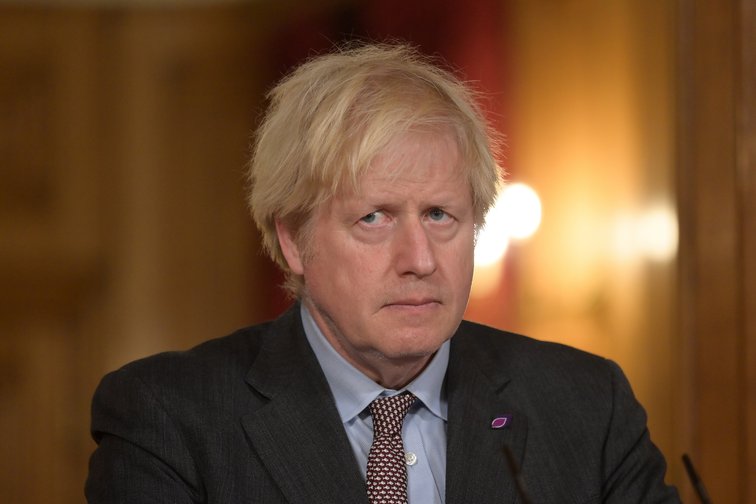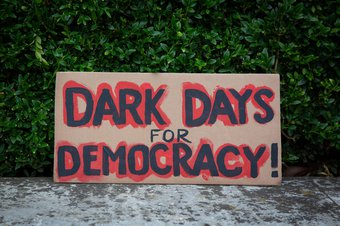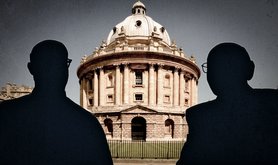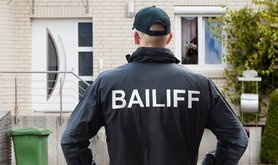
Want a seat in the House of Lords? Be Tory treasurer and donate £3m
Exclusive: Senior Tory accuses Boris Johnson of overseeing ‘scandal in plain sight’ as it’s revealed party treasurers who donate £3m are almost always offered peerages


Conservative treasurers who donate £3m to the party seem almost guaranteed a peerage.
In the past seven years, every former party treasurer has given at least this amount – and all but the most recently retired have been offered a seat in the House of Lords, a joint investigation by openDemocracy and The Sunday Times has found.
Insiders claim that peerages are being given to wealthy businessmen, in what “appeared to be a reward” for bankrolling Boris Johnson’s party.
The findings are the strongest evidence yet of a new ‘cash for peerages’ scandal, with a former Conservative Party chairman telling The Sunday Times: “Once you pay your £3m, you get your peerage.”
Get dark money out of UK politics!
Sign our petition to put pressure on the government to tighten electoral laws and shine more light on political donations. We need to know who is giving what to our political parties.
The revelations about the scale of access to the Lords for Tory donors comes as Johnson has faced mounting criticism over his attempts to axe parliament's standards watchdog which culminated in Tory MP Owen Paterson standing down this week.
Conservative treasurers are responsible for the party's fundraising efforts, but most also donate huge amounts themselves.
Last year, Boris Johnson controversially overruled the House of Lords Appointments Commission to make former Conservative treasurer Peter Cruddas a peer.
Cruddas, who had previously been implicated in an undercover sting, went on to give half a million pounds within days of joining the Lords – taking his total donations to the Conservatives to just over £3m. He denies any link between the donation and his peerage.
22 of the Tories’ biggest donors have been made lords in the past 11 years, donating a total of £54m
Cruddas is not alone. Since the Conservatives came to power in 2010, successive prime ministers have elevated nine of the party’s former treasurers to the Lords. Each of those appointed since 2014 has donated at least £3m.
In total, 22 of the party’s biggest donors have been made lords in the past 11 years. Together they have donated some £54m to the Tories.
In that time period, the Tories have made at least six more donor nominations to the Lords – but these were blocked by the Lords Appointments Commission, openDemocracy understands.
Lord Farmer, a former Tory treasurer who has donated £8m to the party, told The Sunday Times: “There has been a tradition of ennobling party treasurers.” When asked why, he replied: “no comment.”
‘Lottery winners’
Analysis by openDemocracy, in conjunction with Ben Parker of Brunel University, shows it is staggeringly unlikely that making big political donations is not a factor in securing a peerage nomination.
The odds of so many major Tory donors in the UK population all ending up in the House of Lords is equivalent to entering the National Lottery 12 times in a row – and winning the jackpot every time. Even if the pool of candidates was limited to just Tory party members, the odds of so many donors all becoming Lords would still be equivalent to five National Lottery wins in a row.
Over the same 11 years, other parties have also given peerages to donors – but not on the same scale. Labour has ennobled two major donors, and the Lib Dems five.
While it is illegal to sell titles for “any gift, money or valuable consideration”, the law around this has been enforced only once – in 1933. A ‘cash for honours’ probe in 2006-07 ended with the Crown Prosecution Service (CPS) concluding there was no prospect of conviction.
At the time, the CPS argued that donating “in the hope or expectation of being granted an honour”, or giving honours “in recognition of (in effect, as a reward for)...a gift” were not offences. It said “direct evidence” of an “agreement” would be needed for any prosecution, and that there was none. Similarly, there is no evidence of any agreement covering any of the donors or treasurers of the past 11 years. All the peers who responded maintained that there was no link between their donations and their peerages.
Related story
However, others have raised concerns about the ethics of ennobling so many donors. Lord Jay, who was chair of the Lords Appointments Commission between 2008 and 2013, spoke to The Sunday Times on donations: “When I was there, I think it was probably less of a factor than it is now. But it has been a factor for a very long time.”
For years, all political parties have insisted that appointments are made on the basis of experience, not money, and that the sheer number of donors in the Lords is pure coincidence. But openDemocracy’s figures show just how improbable those claims are.
“It’s become institutionalised that when you’ve done your stint as a Conservative Party treasurer, the chances are you’ll be popped into the House of Lords,” said one ex-minister.
One Tory donor told a Sunday Times source that he gave a million pounds to the party after being encouraged to do so by a party treasurer, who suggested that it could lead to a seat in the House of Lords. He said the party was dangling peerages before donors like “carrots” and that everyone in the party was aware of the “cynical operation”.
But many insiders worry about the consequences of speaking out openly, and claim the party has operated under a “law of Omertà” on the subject.
‘Appeared to be a reward’
Until now, members of the House of Lords Appointments Commission have never talked publicly about the peerage given to Peter Cruddas last year. But one of them, Lord Clark of Windermere, now admits that the episode “left a bad taste in my mouth”. He was one of six commissioners who held a video meeting to discuss nominations last December, assembled in a great hurry.
A source close to the commission elaborated on the time pressure put on its members over Crudas’s nomination: “The papers are coming from the Cabinet Office and they’ve got to be dealt with in days because the prime minister is always saying, ‘I want to make these appointments, I want to make these announcements.’
“There were very strong feelings in the commission about it. It just appeared to be a reward and [commissioners] didn’t feel it was right, to be honest, in view of the money he had given the Tories,” they added. They suggested that the six commissioners – a retired bishop, the Lord-Lieutenant of Belfast, three peers nominated by the major political parties, and a history professor – had been unanimous in voting to block Cruddas’s peerage.
Johnson was the first prime minister to overrule the commission, arguing that Cruddas deserved a peerage as a “clear and rare exception” because of his contributions to business, charity and politics. However, Johnson did not address the commission’s concerns about Cruddas’s donations to the party.
Cruddas himself has said it is “definitely not true” that his peerage and donations were in any way linked, adding: “That would be corruption and that's definitely not the case.”
It’s a trade for Johnson’s own interest. He believes he is immune from the rules
The Lords Appointments Commission considers “the credibility of individuals who have made significant political donations”. When it vets party donors for peerages, it says it reaches “a view on whether or not the individual could have been a credible nominee if he or she had made no financial contribution.”
A former Conservative Party chairman criticised Johnson’s approach to peerages: “It’s a trade for his own interest. He believes he is immune from the rules and hence overruled the commission [over Cruddas], which is a very serious thing.”
His concerns were echoed by the recently retired Lords Speaker, Lord Fowler, who told The Sunday Times: “The decision of the commission should be final and should not be ignored by the government.”
An example of the patterns in these donations is that of former Tory treasurer, Andrew Fraser. He had been giving money to the party since 2004, but his big donations accelerated in the two years before he was awarded a peerage in 2016.
Just five weeks before David Cameron’s honours list was announced, he gave a further £261,900 – taking him over the £3m threshold.
Yet the year after taking the title Baron Fraser of Corriegarth, Fraser abruptly ended his donations and never gave another penny to the party again. Over the following four years, he spoke only four times in the Lords. He died earlier this year.
One insider told The Sunday Times that Tory donors in the House of Lords often seemed to have more interest in securing “the title” rather than taking on the legislative responsibility that comes with a peerage.
There is no suggestion that any of these lords have personally broken rules or directly paid for their peerages. But Lord Clark of the Lords Appointments Commission said the £3m donation pattern was “very disconcerting and clearly wrong”.
‘A scandal in plain sight’
Speaking to The Sunday Times, one former Conservative cabinet minister said the £3m donation pattern showed that peerages were being used to reward the millionaires who bankrolled the party, and accused the party of overseeing “a scandal in plain sight”.
They added: “When it looks quite so transactional, of course it feels very uncomfortable.”
Anna Soubry, a former Conservative business and defence minister who has now left the party, said it was “shocking” that donors were being elevated to the Lords after donating £3m.
“It is a critical part of our legislature. This isn’t something like being made a knight or a CBE, or any of the other honours that [are] within the gift of government,” she said.
“Laws and bills have to go to the Lords and [the system] is being grossly abused. It’s an embarrassment, it is absolutely appalling. It just undermines the real value of the House of Lords and those members who actually play a really important part of it.”
A Conservative Party spokesman said: "We do not believe that successful business people and philanthropists who contribute to political causes and parties should be disqualified from sitting in the legislature.”
A Downing Street spokesperson said: “Peerages reflect long-standing contributions to civic life and also a willingness to further contribute to public life as a legislator in the Second Chamber.
“It is wrong to criticise individuals being honoured just because they have also chosen to support or donate to a political party. Donations should be transparent, but that is not an excuse to knock people for broader philanthropy, enterprise and public service.
“Volunteering and supporting a political party is part of our civic democracy.
“In the UK, taxpayers do not have to bankroll political parties’ campaigning. Political parties have to raise money themselves, and follow transparency and compliance rules laid out in law.”
Lord Cruddas did not respond to our request for comment.
Read more
Get our weekly email





Comments
We encourage anyone to comment, please consult the oD commenting guidelines if you have any questions.